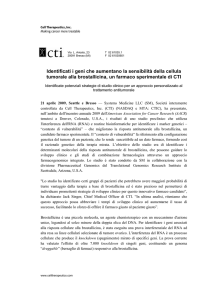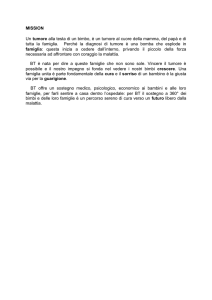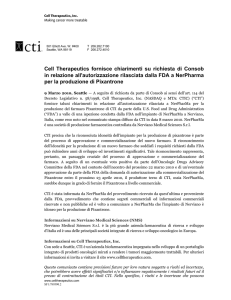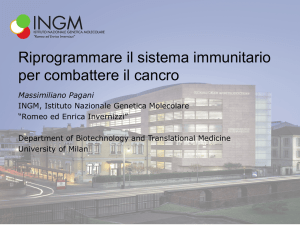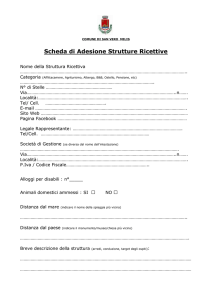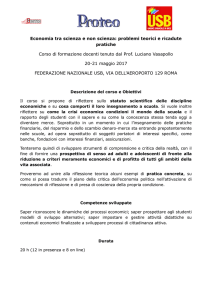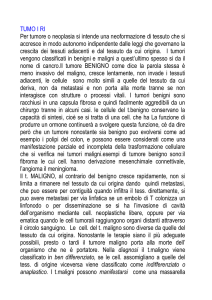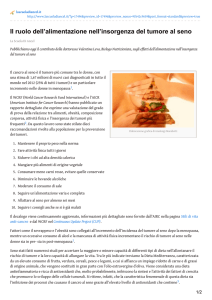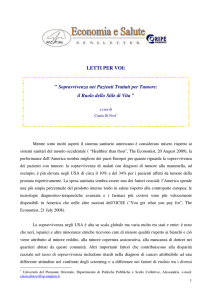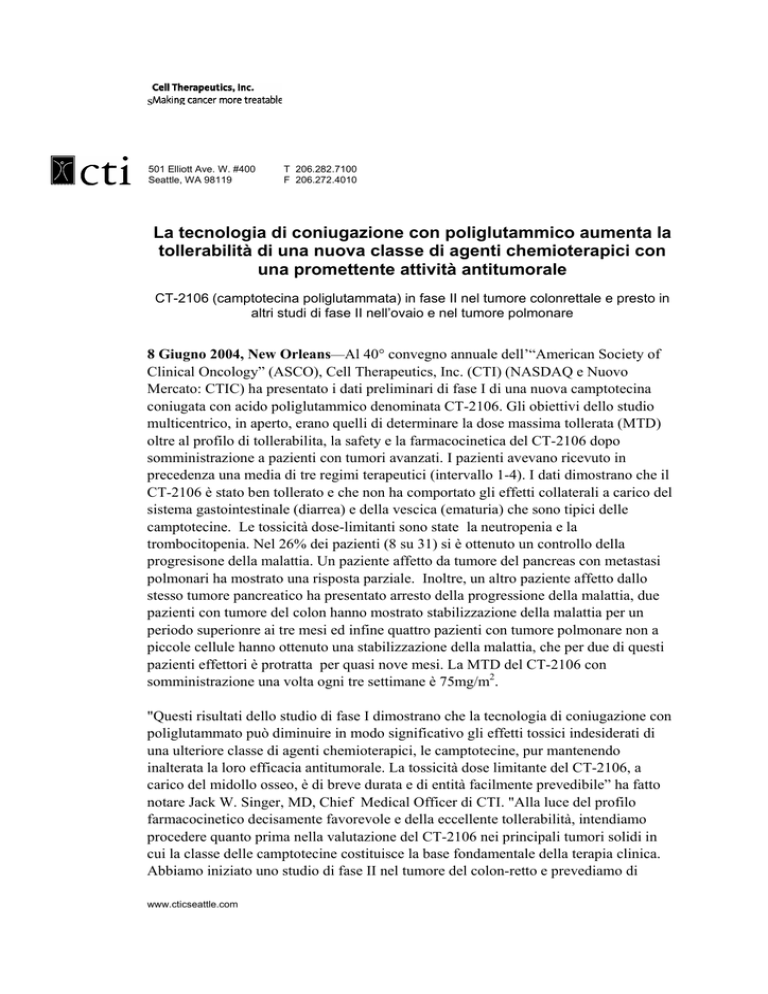
s
501 Elliott Ave. W. #400
Seattle, WA 98119
T 206.282.7100
F 206.272.4010
La tecnologia di coniugazione con poliglutammico aumenta la
tollerabilità di una nuova classe di agenti chemioterapici con
una promettente attività antitumorale
CT-2106 (camptotecina poliglutammata) in fase II nel tumore colonrettale e presto in
altri studi di fase II nell’ovaio e nel tumore polmonare
8 Giugno 2004, New Orleans—Al 40° convegno annuale dell’“American Society of
Clinical Oncology” (ASCO), Cell Therapeutics, Inc. (CTI) (NASDAQ e Nuovo
Mercato: CTIC) ha presentato i dati preliminari di fase I di una nuova camptotecina
coniugata con acido poliglutammico denominata CT-2106. Gli obiettivi dello studio
multicentrico, in aperto, erano quelli di determinare la dose massima tollerata (MTD)
oltre al profilo di tollerabilita, la safety e la farmacocinetica del CT-2106 dopo
somministrazione a pazienti con tumori avanzati. I pazienti avevano ricevuto in
precedenza una media di tre regimi terapeutici (intervallo 1-4). I dati dimostrano che il
CT-2106 è stato ben tollerato e che non ha comportato gli effetti collaterali a carico del
sistema gastointestinale (diarrea) e della vescica (ematuria) che sono tipici delle
camptotecine. Le tossicità dose-limitanti sono state la neutropenia e la
trombocitopenia. Nel 26% dei pazienti (8 su 31) si è ottenuto un controllo della
progresisone della malattia. Un paziente affetto da tumore del pancreas con metastasi
polmonari ha mostrato una risposta parziale. Inoltre, un altro paziente affetto dallo
stesso tumore pancreatico ha presentato arresto della progressione della malattia, due
pazienti con tumore del colon hanno mostrato stabilizzazione della malattia per un
periodo superionre ai tre mesi ed infine quattro pazienti con tumore polmonare non a
piccole cellule hanno ottenuto una stabilizzazione della malattia, che per due di questi
pazienti effettori è protratta per quasi nove mesi. La MTD del CT-2106 con
somministrazione una volta ogni tre settimane è 75mg/m2.
"Questi risultati dello studio di fase I dimostrano che la tecnologia di coniugazione con
poliglutammato può diminuire in modo significativo gli effetti tossici indesiderati di
una ulteriore classe di agenti chemioterapici, le camptotecine, pur mantenendo
inalterata la loro efficacia antitumorale. La tossicità dose limitante del CT-2106, a
carico del midollo osseo, è di breve durata e di entità facilmente prevedibile” ha fatto
notare Jack W. Singer, MD, Chief Medical Officer di CTI. "Alla luce del profilo
farmacocinetico decisamente favorevole e della eccellente tollerabilità, intendiamo
procedere quanto prima nella valutazione del CT-2106 nei principali tumori solidi in
cui la classe delle camptotecine costituisce la base fondamentale della terapia clinica.
Abbiamo iniziato uno studio di fase II nel tumore del colon-retto e prevediamo di
www.cticseattle.com
Page 2 of 4
CT-2106 at ASCO
iniziare studi di fase II nel tumore dell’ovaio e nel tumore polmonare a piccole cellule
nel corso dell’anno".
Le camptotecine sono una classe di farmaci antitumorali il cui mercato mondiale è in
rapida crescita dato che vengono comunemente usate per il trattamento del tumore del
colon-retto, del polmone e dell’ovaio, anche se il loro potenziale è limitato da gravi
effetti collaterali. La camptotecina naturale, 20S-camptotecina, è uno dei più potenti
agenti antitumorali di questa classe ed è stata valutata in studi di fase I/II dal National
Cancer Institute (NCI) ma il suo sviluppo è stato bloccato a causa delle tossicità a
carico dell’apparato gastrointestinale e della vescica, tossicità che non sono state invece
osservate nello studio di fase I con CT-2106.
CT-2106 è il secondo farmaco nel portafoglio prodotti di CTI, dopo XYOTAX™ (paclitaxelpoliglutammato) che utilizza la tecnologia della coniugazione di un agente antitumorale con una
molecola di acido poliglutammico, un poliamminoacido biodegradabile. L’esperienza clinica con
XYOTAX, che si basa su alcuni studi di fase III in fase di completamento per il trattamento del
carcinoma polmonare non microcitoma, conferma i nostri dati preclinici che hanno dimostrato la
possibilità di eliminare per mezzo della tecnologia del poliglutammato la necessità di agenti
tossici solubilizzanti e di ridurre l’esposizione dei tessuti sani al farmaco mentre aumenta la
quantità di farmaco che raggiunge il tessuto antitumorale.
Cell Therapeutics, Inc.
Con Sede a Seattle, CTI è un’azienda biofarmaceutica impegnata a sviluppare un portfolio integrato di
prodotti oncologici mirati a rendere il cancro maggiormente trattabile. Per ulteriori informazioni visitare il
sito www.cticseattle.com.
###
Per ulteriori informazioni contattare:
In Europa
Media
Cell Therapeutics, Inc. (Europe)
Karl Hanks,
T: +39 02 61035807; M: +39 335 7882247
E: [email protected]
Accento (Italia)
Cristina Tronconi, T: +39 02 86465196, [email protected]
Chiara Migliarini, T: +39 02 86465196, [email protected]
Investitori
Media
Cell Therapeutics, Inc.
Leah Grant
T: +1 206.282.7100 F:+1206.272.4010
E: [email protected]
www.cticseattle.com/investors.htm
Cell Therapeutics, Inc.
Candice Douglass
T: +1 206.272.4472 F: +1206.272.4010
E: [email protected]
www.cticseattle.com/media.htm
www.cticseattle.com
Page 3 of 4
CT-2106 at ASCO
s
501 Elliott Ave. W. #400
Seattle, WA 98119
T 206.282.7100
F 206.272.4010
Polyglutamate Technology Enhances Tolerability of Important
Class of Chemotherapy and Demonstrates Encouraging Antitumor Activity
CT-2106 (polyglutamate camptothecin) in phase II in colorectal cancer and expected
to advance to phase II in ovarian and lung cancers
June 8, 2004 New Orleans—At the 40th Annual Meeting of the American Society of
Clinical Oncology, Cell Therapeutics, Inc. (CTI) (NASDAQ and Nuovo Mercato:
CTIC) presented preliminary phase I data on a novel polyglutamate camptothecin,
known as CT-2106. The objectives of the multicenter, open-label study are to
determine the maximum tolerated dose (MTD) and to evaluate the tolerability, safety
and pharmacokinetics of CT-2106 when administered to patients with advanced
malignancies. Patients received a median of three prior regimens (range 1-4). The data
showed that CT-2106 was well tolerated and lacked the severe gastrointestinal
(diarrhea) and bladder (hematuria) toxicities which are typical for camptothecins. The
dose limiting side effects were neutropenia and thrombocytopenia. Twenty-six percent
of patients (eight out of 31) achieved disease control. One patient with pancreatic
cancer, that had spread to the lungs, exhibited a partial response another pancreatic
patient achieved disease control, two patients with colorectal cancer had stable disease
for more than three months, and four patients with non-small cell lung cancer achieved
stable disease, two of those patients experienced disease control for almost nine
months. The MTD of CT-2106 administered every third week has been determined to
be 75mg/m2.
"The results of this phase I trial support the finding that our polyglutamate technology
can significantly modify the severe side effects of another important class of
chemotherapy drugs, the camptothecins, while retaining their potent anti-tumor activity.
The dose limiting toxicity was short-lived and predictable marrow suppression," noted
Jack W. Singer MD, Chief Medical Officer at CTI. "Given the favorable
pharmacokinetics and excellent tolerability we are moving quickly to examine CT-2106
in the three tumor types where camptothecins are a mainstay of therapy. We have
initiated a phase II study in colorectal cancer and expect to initiate phase II trials in
ovarian and small cell lung cancer later this year."
www.cticseattle.com
Page 4 of 4
CT-2106 at ASCO
Camptothecins are one of the world's fastest growing classes of anti-cancer agents and
are commonly used as treatment for colorectal, lung and ovarian cancer, however they
are limited by severe side effects. The naturally occurring product, 20S-camptothecin is
among the most potent compounds in this class of agents and was evaluated in phase I
and II trials by the National Cancer Institute (NCI), but its development was
discontinued due to severe gastrointestinal and bladder toxicities, which have not been
seen with CT-2106 in the phase I study.
CT-2106 is the second agent in CTI's portfolio, after XYOTAX™ (paclitaxel
poliglumex), to exploit the polyglutamate-conjugate technology, where an anti-cancer
agent is conjugated to a naturally biodegradable poly-amino acid. The clinical
experience with XYOTAX, which is completing enrollment in multiple phase III trials
for non-small cell lung cancer, further confirms CTI's preclinical work, which has
shown that the polyglutamate technology has the ability to eliminate the need for toxic
solubilizing agents and decrease the amount of drug exposure in normal tissues while
increasing the amount of drug reaching tumor tissues
About Cell Therapeutics, Inc.
Headquartered in Seattle, CTI is a biopharmaceutical company committed to
developing an integrated portfolio of oncology products aimed at making cancer more
treatable. For additional information, please visit www.cticseattle.com.
This announcement includes forward-looking statements that involve a number of risks and
uncertainties, the outcome of which could materially and/or adversely affect actual future results.
Specifically, the risks and uncertainties that could affect the development of CTI's products under
development include risks associated with preclinical and clinical developments in the
biopharmaceutical industry in general and with CT-2106 in particular including, without limitation, the
potential failure of CT-2106 to prove safe and effective for treatment of colorectal, ovarian, or small cell
lung cancer, determinations by regulatory, patent and administrative governmental authorities,
competitive factors, technological developments, costs of developing, producing and selling CT-2106,
and the risk factors listed or described from time to time in the Company's filings with the Securities and
Exchange Commission including, without limitation, the Company's most recent filings on Forms 10-K,
8-K, S-3, S-4, and 10-Q.
###
Investors
Media
Cell Therapeutics, Inc.
Leah Grant
T: 206.282.7100
F: 206.272.4010
E: [email protected]
www.cticseattle.com/investors.htm
Cell Therapeutics, Inc.
Candice Douglass
T: 206.272.4472
F: 206.272.4010
E: [email protected]
www.cticseattle.com/media.htm
Cell Therapeutics, Inc. (Europe)
Karl Hanks
T: 39 026 103 5807
F: 39 026 103 5601
E: [email protected]
www.cticseattle.com

